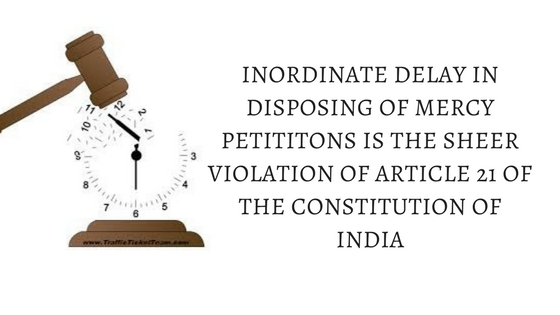
Aapka Consultant Judgment Series- In this series, we are providing case analysis of Landmark Judgments of Hon’ble Supreme Court of India.
Shatrughan Chauhan & Anr. v. Union of India & Ors.
(2014) 3 SCC 1
JUDGES: P. Sathasivam, Ranjan Gogoi and Shiva Kirti Singh
Date of Decision: 21-01-2014
FACTS:-
The writ petitions, under Article 32 of the Constitution of India, have been filed either by the convicts, who were awarded death sentence or by their family members or by public-spirited bodies like People’s Union for Democratic Rights (PUDR) based on the rejection of mercy petitions by the Governor and the President of India. The main prayer consistently relates to the issuance of a writ of declaration declaring that execution of sentence of death pursuant to the rejection of the mercy petitions by the President of India is unconstitutional and to set aside the death sentence imposed upon them by commuting the same to imprisonment for life.
ISSUE:-
Whether the inordinate delay in execution will be a ground for commutation of sentence of death into life imprisonment and is in violation of Article 21 of the Constitution of India?
JUDGMENT:-
The Supreme Court held that death sentence of a condemned prisoner can be commuted to life imprisonment on the ground of delay on the part of the government in deciding the mercy plea.
The Supreme Court has asserted that the execution of death penalty in the face of such an inordinate delay would infringe fundamental right to life under Article 21 of the Constitution, which would invite the exercise of the jurisdiction by this Court. Undue long delay in the execution of death sentence will entitle the condemned prisoner to approach this Court under Article 32 of the Constitution of India but this Court will only examine the nature of delay caused and circumstances that ensued after sentence was finally confirmed by the judicial process and will have no jurisdiction to re-open the conclusions reached by the court while finally maintaining the sentence of death. This Court considers the question of inordinate delay in the light of circumstances of the case to decide whether the execution of sentence should be carried out or should be altered into imprisonment for life. No fixed period of delay could be held to make the sentence of death in executable and to this extent the decision in Vatheeswaran v. State of Tamil Nadu [(1983) 2 SCC 68] cannot be said to lay down the correct law and therefore to that extent stands overruled.
The Court observed that keeping a convict in suspense while consideration of his mercy petition by the President for many years is certainly an agony for him/her. It creates adverse physical conditions and psychological stresses on the convict under sentence of death. Indisputably, this Court, while considering the rejection of the clemency petition by the President, under Article 32 read with Article 21 of the Constitution, cannot excuse the distressing delay caused to the convict only on the basis of the gravity of the crime. It is clear that after the completion of the judicial process, if the convict files a mercy petition to the Governor/President, it is incumbent on the authorities to dispose of the same expeditiously. Though no time limit can be fixed for the Governor and the President, it is the duty of the executive to expedite the matter at every stage, viz., calling for the records, orders and documents filed in the court, preparation of the note for approval of the Minister concerned, and the ultimate decision of the constitutional authorities.
Accordingly, if there is undue, unexplained and inordinate delay in execution due to pendency of mercy petitions or the executive as well as the constitutional authorities have failed to take note of/consider the relevant aspects, this Court is well within its powers under Article 32 to hear the grievance of the convict and commute the death sentence into life imprisonment on this ground alone however, only after satisfying that the delay was not caused at the instance of the accused himself. To this extent, the jurisprudence has developed in the light of the mandate given in our Constitution as well as various Universal Declarations and directions issued by the United Nations. Since it is well established that Article 21 of the Constitution does not end with the pronouncement of sentence but extends to the stage of execution of that sentence, as already asserted, prolonged delay in execution of sentence of death has a dehumanizing effect on the accused. Delay caused by circumstances beyond the prisoners’ control mandates commutation of death sentence. A self-imposed rule should be followed by the executive authorities rigorously, that every such petition shall be disposed of within a period of three months from the date on which it is received. Long and interminable delays in the disposal of these petitions are a serious hurdle in the dispensation of justice and indeed, such delays tend to shake the confidence of the people in the very system of justice.
HELD:-
The Court held that unexplained delay is one of the grounds for commutation of sentence of death sentence into life imprisonment and said supervening circumstance is applicable to all types of cases.
To Get Legal Opinion from Advocates/ Legal Experts, Please click here
To Get Legal Opinion from Retired Hon’ble Judges, Please click here











